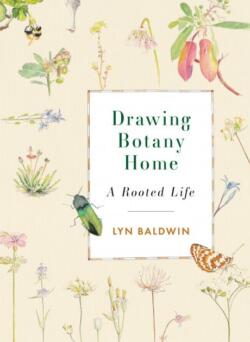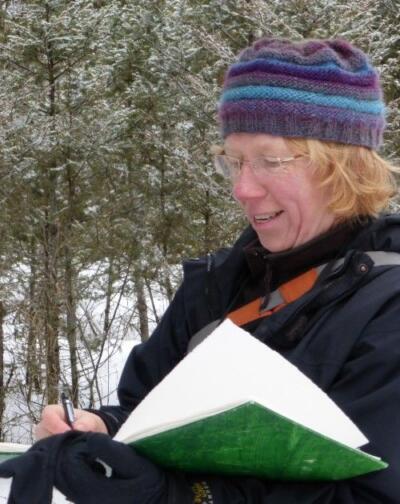1892 ‘Plant aware, nature aware’
Drawing Botany Home: A Rooted Life
by Lyn Baldwin
Victoria: Rocky Mountain Books, 2023
$30.00 / 9781771605922
Reviewed by Nina Shoroplova
*
 Lyn Baldwin, PhD, has lived a life at the “confluence of choice and change.” As have most of us. But as a botanist, an ecologist, and a philosopher, especially about her own life and how she accomplished what she has accomplished, Dr. Baldwin realizes that her life has hinged not only on the choices others made for her when she was little but also on the choices she has made carefully and on those she made without any further thought at all.
Lyn Baldwin, PhD, has lived a life at the “confluence of choice and change.” As have most of us. But as a botanist, an ecologist, and a philosopher, especially about her own life and how she accomplished what she has accomplished, Dr. Baldwin realizes that her life has hinged not only on the choices others made for her when she was little but also on the choices she has made carefully and on those she made without any further thought at all.
Take her choice to study science at a liberal arts college: she really didn’t consider the ramifications. For instance, even though she didn’t start creating her field journals until she had been hired to work as a botanist—she had just finished her master’s degree—science and art were already married in her mind.
Being a botanist does indeed require artistic skills. My high school botany teacher had us draw plants. Carefully. Indoors. Baldwin does far more than that. She draws plants in situ, the native plants of a certain place, outdoors. On her knees, bum in the air, typical botanist’s posture, she says. I was tempted to enrol in a botanical drawing and painting class as I read her book. I resisted the urge but I am wondering what I might be missing by using only my camera for capturing the look, the feel, and the mood of a tree, a shrub, a herbaceous plant as it moves and grows in the world I inhabit.

Baldwin writes about “plant blindness” and how common it is these days when over half of the people in this world are living in cities and travelling from one concrete jungle to a highway to the next concrete jungle without seeing the nature in between. We city dwellers are apt to view vegetables as commodities sold in grocery stores rather than as plants brought from some other part of the world and grown where convenient to sell year-round. Or grown by ourselves in a patch of soil.
British Columbia is home to 2,500 different flowering plants, the Earth to 400,000 plant species. Such figures are daunting. Where to start? Best to start with what we know. Or recognize. By looking.
Some of Baldwin’s colourful field journal pages are inserted into the book (some as two-page spreads, some as singles) at the rate of about one per chapter. I read each detailed drawing carefully: the title, the notes, the names, the map, the colourfully painted sketches, looking at stems and leaves and petals. And environment. For Baldwin, these are memory maps of a time and place. But these field sketches can take me there too, in the same way an old photo can return us to the time and place and mood and memory of a situation and take someone else there too.

This is a very personal book. It is a memoir, rooting us into this professional botanist’s personal life. More science married to art. Her upbringing as a daughter, a stepdaughter, and a sibling was rich in experiences but poor in finances; rich in freedom but hapless in steadiness; rich in journeying but unstable in security. Her life as a wife and mother are strongly rooted and supported. And more fulfilling. Steadier.
I haven’t finished reading this book yet. I’ve stopped halfway through. Intentionally. I plan on slowly savouring Baldwin’s revealing text to the epilogue, to the notes, to the bibliography. If I were to finish reading it before writing this review, I would be tempted to summarize it. You don’t want that.

Read Drawing Botany Home: A Rooted Life for yourself and see if it changes the way you see the world around you, no longer plant blind, but plant aware, nature aware, concerned about what each of us can do to look after our planet better than we have been looking after it.
Dr. Baldwin carefully sees, studies, identifies, draws, and creates a journal memory for each of the plants she engages with, in what she calls a quadrat, a new term to me. This identification work is the basis for humanity’s appreciation of what plants exist in the world. It is the basis of conservation. How can we look after our planet and its plants if we don’t know what’s here now? Is the plant native and possibly disappearing as our climate changes? Or is it introduced and overwhelming native plants? Even worse, is it invasive, like the spotted knapweed she finds growing its bright purple flowers at Botany Pond (page 76).
Now teaching botany and ecology at Thompson Rivers University in Kamloops, Baldwin is interacting with and teaching the very people who can carry her plant knowledge out into the world. She is like a Douglas-fir dropping its seeds into soil. Let’s hope the soil and conditions are fertile.
*

Nina Shoroplova is the author of Legacy of Trees: Purposeful Wandering in Vancouver’s Stanley Park, published by Heritage House in 2020, and a Finalist in the 2020 British Columbia Lieutenant Governor’s Historical Writing Awards. Her first book was Cattle Ranch: The Story of the Douglas Lake Cattle Company, published by Douglas & McIntyre in 1979, and a finalist in Eaton’s 6th Annual BC Book Awards, 1979. As a Vancouver Master Gardener, Shoroplova writes articles about and take photographs of plants for the VMG website (www.mgabc.org/). She leads tree-identification walks on behalf of Nature Vancouver, Stanley Park Ecology Society, and the Vancouver Cherry Blossom Festival. A professional member of the Canadian Authors Association, she is currently working on her next book. Once again, the topic will be some aspect of trees.
*
The British Columbia Review
Interim Editors, 2023-24: Trevor Marc Hughes (non-fiction), Brett Josef Grubisic (fiction)
Publisher: Richard Mackie
Formerly The Ormsby Review, The British Columbia Review is an on-line book review and journal service for BC writers and readers. The Advisory Board now consists of Jean Barman, Wade Davis, Robin Fisher, Barry Gough, Hugh Johnston, Kathy Mezei, Patricia Roy, Maria Tippett, and Graeme Wynn. Provincial Government Patron (since September 2018): Creative BC. Honorary Patron: Yosef Wosk. Scholarly Patron: SFU Graduate Liberal Studies. The British Columbia Review was founded in 2016 by Richard Mackie and Alan Twigg.
“Only connect.” – E.M. Forster